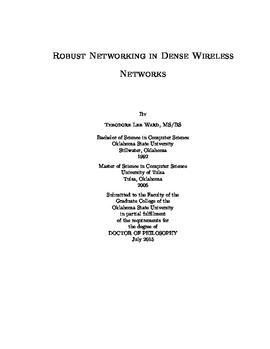| dc.contributor.author | Ward, Theodore Lee | |
| dc.date.accessioned | 2016-09-29T18:43:30Z | |
| dc.date.available | 2016-09-29T18:43:30Z | |
| dc.date.issued | 2015-07 | |
| dc.identifier.uri | https://hdl.handle.net/11244/45328 | |
| dc.description.abstract | Cyber Physical Systems (CPS) and Nanotechnology are emerging fields that promise to unite the physical and computing realms through the use of impossibly tiny sensor based devices called motes. The revolutionary nature of these systems stems from the unique properties of these mote devices such as their use of sensors, small size and low cost per unit. | |
| dc.description.abstract | These CPS networks are expected to control real time critical applications requiring deployment in remote and hostile environments in which far reaching communication or constant human oversight can not be assumed. For this reason some of the defining characteristics of CPS are the ability to be self-configuring, self-policing and fault tolerant. One area of concern is wireless communication technology, existing methods have been deemed inadequate as a foundation for cyber physical systems. | |
| dc.description.abstract | We present a distributed wireless communication strategy that can achieve a prob-abilistic degree of logical redundancy of communication between the motes that sense information and the data sinks that consume the information. We can achieve this by taking advantage of the expected low cost and small size of motes in order to assume the inevitability of, or ability to deploy, very dense mote populations. Our strategy then is to partition the motes in a densely populated CPS network into multiple overlapping logical networks (LNETs). Each LNET operates as an independent CPS and thus if some event is sensed by motes in n separate LNETs, then accounts of the event will be reported with redundancy equal to n - 1. | |
| dc.description.abstract | Our simulations show that as population density fluctuates, partitioning in this manner provides capacity scaling by expanding bandwidth and decreasing resource contention, and increased reliability of communication due to logical redundancy. | |
| dc.format | application/pdf | |
| dc.language | en_US | |
| dc.rights | Copyright is held by the author who has granted the Oklahoma State University Library the non-exclusive right to share this material in its institutional repository. Contact Digital Library Services at lib-dls@okstate.edu or 405-744-9161 for the permission policy on the use, reproduction or distribution of this material. | |
| dc.title | Robust networking in dense wireless networks | |
| osu.filename | Ward_okstate_0664D_14251.pdf | |
| osu.accesstype | Open Access | |
| dc.type.genre | Dissertation | |
| dc.type.material | Text | |
| thesis.degree.discipline | Computer Science | |
| thesis.degree.grantor | Oklahoma State University | |
